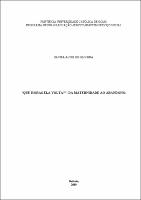| Compartilhamento |


|
Use este identificador para citar ou linkar para este item:
http://tede2.pucgoias.edu.br:8080/handle/tede/4273| Tipo do documento: | Dissertação |
| Título: | "Que horas ela volta?" : da maternidade ao abandono |
| Autor: | Oliveira, Elvira Alves de  |
| Primeiro orientador: | Rocha, Maria José Pereira |
| Primeiro membro da banca: | Machado, Maria Conceição Sarmento Padial |
| Segundo membro da banca: | Costa, Maria Betânia Gondim da |
| Resumo: | Esta dissertação é resultado de um projeto de pesquisa que nasce na vivência pessoal e soma-se a identidade profissional. Seu objeto de estudo é a maternidade solo, que se encarna na problemática de questionar, quais os desafios sociais em ser mãe solo e mulher trabalhadora? Se propõe a investigar os desafios em ser mulher-mãe-trabalhadora no contexto da sociedade contemporânea. A ideia é alinhar a discussão entre Serviço Social e as intersecções de gênero, raça/etnia, classe, sexualidade, dentre outros. Foi escolhido o filme: “Que horas ela volta?”, para o aprofundamento dessas e outras questões. Ao propor o debate entre o filme que aborda essencialmente maternidade sob a perspectiva de classe, e o papel da/o Assistente Social na efetivação de direitos sociais, civis, políticos e reprodutivos, este trabalho compõe o campo de produções da teoria social crítica voltada para as mulheres em situação de vulnerabilidade. Essa predeterminação é parte de uma estrutura social articulada com a supremacia masculina em todas as instâncias sociais, e para que a lei se faça, é necessária a intervenção junto aos órgãos representativos do Estado para a população. Define-se o Judiciário brasileiro como área de poder frente a garantia e controle dos direitos, uma vez que também é eixo de análise o abandono paterno-filial nas relações de constituição familiar e seu rebatimento na construção sócio histórica da mulher. A solidão da maternidade é romantizada e invisibilizada. Repleta de estigmas que ignoram os mais complexos estados civis e sociais de mulheres-mães (solo, viúvas, divorciadas e etc.), entende-se nesse trabalho que mãe não é um estado civil que deva por assim ser caracterizado. Logo, esta pesquisa objetiva externar sobre as expressões de maternidade e os abandonos que existem, relacionando com o filme para assim exemplificar as raízes estruturantes desse vínculo de poder. |
| Abstract: | This dissertation is the result of a research project which emerges in the personal experience and adds to the professional identification. Its object of study is the motherhood alone, that makes part of the problematic of questioning, what are the social challenges in being a mother alone and a working woman? It proposes to investigate the challenges of being a womanmother-worker in the context of the contemporary society. The idea is to align the discussion between Social Work and the intersections of gender, race / ethnicity, class, sexuality, among others. The film was chosen: "The Second Mother", to deepen these and other issues. In proposing the debate between the film that essentially addresses maternity from a class perspective, and the role of the Social Worker in the realization of social, civil, political and reproductive rights, this work composes the field of productions of critical social theory aimed at the women in situations of vulnerability. This predetermination is part of a social structure articulated with male supremacy in all social instances and, for the law to be done, it is necessary the intervention of the representative entities of the State for the population. The Brazilian Judiciary is defined as an area of power in face of guarantee and control of rights, since it is also an axis of analysis of the paternal-filial abandonment in the relations of family constitution and its bias in the socio-historical construction of the woman. The solitude of motherhood is romanticized and invisibilized. Full of stigmas that ignore the most complex civil and social states of women-mothers (alone, widows, divorcees, etc.), it is understood in this work that the mother is not a civil state that should therefore be like this characterized. Ergo, this research aims to express the manifestations of maternity and the abandonment that exist, relating them to the film to exemplify the structuring roots of this bond of power. |
| Palavras-chave: | Maternidade solo, classe, dominação, capitalismo e poder. Motherhood alone, class, domination, capitalism and power. |
| Área(s) do CNPq: | CIENCIAS SOCIAIS APLICADAS::SERVICO SOCIAL |
| Idioma: | por |
| País: | Brasil |
| Instituição: | Pontifícia Universidade Católica de Goiás |
| Sigla da instituição: | PUC Goiás |
| Departamento: | Escola de Ciências Sociais e Saúde::Curso de Serviço Social |
| Programa: | Programa de Pós-Graduação STRICTO SENSU em Serviço Social |
| Citação: | Oliveira, Elvira Alves de. "Que horas ela volta?" : da maternidade ao abandono. 2019. 114 f. Dissertação (Programa de Pós-Graduação STRICTO SENSU em Serviço Social) - Pontifícia Universidade Católica de Goiás, Goiânia-GO. |
| Tipo de acesso: | Acesso Aberto |
| URI: | http://tede2.pucgoias.edu.br:8080/handle/tede/4273 |
| Data de defesa: | 27-Mar-2019 |
| Aparece nas coleções: | Mestrado em Serviço Social |
Arquivos associados a este item:
| Arquivo | Descrição | Tamanho | Formato | |
|---|---|---|---|---|
| Elvira Alves de Oliveira.pdf | Texto Completo | 1,12 MB | Adobe PDF |  Baixar/Abrir Pré-Visualizar |
Os itens no repositório estão protegidos por copyright, com todos os direitos reservados, salvo quando é indicado o contrário.




